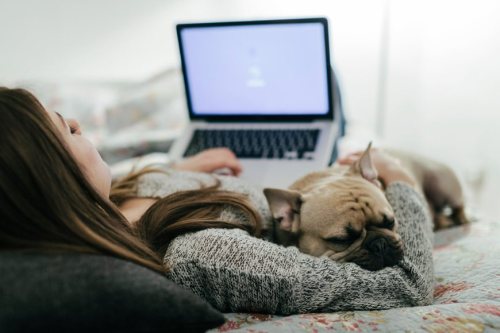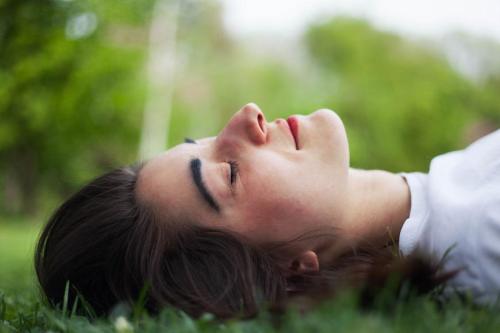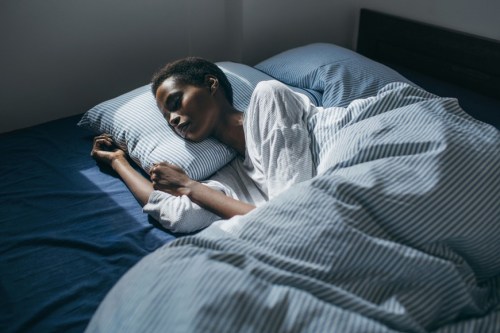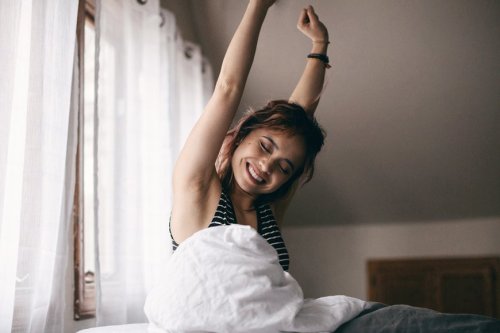Sleep is a precious commodity that we could all use a bit more of in today’s quick-to-click culture—our health and wellbeing depend on it. Consider this: Sleep deprivation has been linked to depression and anxiety, cardiovascular disease, diabetes, and obesity. And just two nights in a row of less than six hours of sleep can affect your performance for the next six days.
“Prolonged lack of sleep can greatly affect our mood, attention, concentration, memory, relationship with others, work performance, overall health, and so much more,” attests clinical psychologist Jodi J. De Luca, PhD. (Whoa.) And beyond just how much sleep we get, how deeply we sleep is also critical, she adds. “It’s important that our sleep is restful,” she explains. “Our body heals and repairs itself on a physical, psychological, and emotional level during sleep.”
But what can we do to truly improve the quality of our sleep? From feng shui-ing your bedroom to journaling before bed to eating more sushi, there’s a ton of good-Zzz’s advice out there—and attempting to navigate it all can be enough to keep you up at night. The answer: Start with these three science-backed sleep hacks, all of which are said to improve your circadian rhythm—the natural sleep-wake cycle that tells your body to go to sleep at night and wake up in the morning. (It tends to get thrown off as we age, so if yours is out of whack, you’re not alone.) Because, really, who has time to experiment in our always-on society?
Keep reading for the doctor-endorsed circadian rhythm hacks that’ll give you better sleep tonight.

Ditch your devices
The number-one most important thing you can do to improve both the quality and duration of your sleep is to stash away your smartphone and tablet way before bedtime. The blue light produced by our digital screens suppresses the body’s natural ability to synthesize melatonin, says Jonathan Zipkin, MD, of Northwell Health-GoHealth Urgent Care. When melatonin—a naturally occurring hormone that helps regulate our sleep-wake cycles—is off balance, our sleep is too, according to a study from Harvard Medical School.
To decrease exposure, Dr. Zipkin suggests putting your devices away two hours before bed. “Avoiding screen time before bed allows your body to slowly decompress,” he says. Another alternative is to use a light-filtering app or browser add-on if you can’t possibly part with your device for that long.
And consider your overhead lighting, too. Fluorescent and LED bulbs produce blue-wavelength light at a higher rate than old-fashioned incandescent bulbs.

Let the sunshine in
Go outside every day, preferably in the morning, and let your skin soak in some sun. Exposure to natural light, especially in the morning, helps set your circadian rhythm. (Just don’t forget the sunscreen.)
“Your circadian rhythm relies heavily on light to help it understand day versus night so it can send signals to your body to produce melatonin, which helps it achieve better-quality sleep,” says Kalle Simpson, sleep expert and founder of the company Night.
Thanks to the awesome power of the sun, your body knows it’s time to be awake and alert, and in turn, when darkness falls, it knows it’s time to fall into a natural rest cycle, she says.

Keep it cool
Our body temperature naturally drops when it’s time to sleep, again thanks to our circadian rhythm. Researchers believe if you sleep in a cooler environment, you can help your body fall into restfulness more easily.
Simpson’s tips: Avoid exercise late at night because it will raise your core body temperature, set your thermostat between 60 and 69 degrees (or just open a window), and even try sleeping naked. You could also try shopping for tech-enabled bedding, like biometric sheets and cool water pillows. Yep, it’s official—chilling out can help you sleep more soundly in more ways than one.
If you find it hard to part with your phone before bed, you’re not alone—tech addiction is a serious problem. Start reducing your dependency with this day-long digital detox plan.
Sign Up for Our Daily Newsletter
Get all the latest in wellness, trends, food, fitness, beauty, and more delivered right to your inbox.
Got it, you've been added to our email list.











